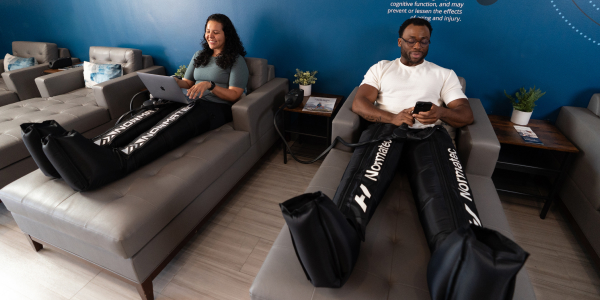CoQ10 stands for Coenzyme Q10. It’s also known as ubiquinone, as it’s ubiquitous in animals, most bacteria, and humans. This fat-soluble compound is a key player in your body’s energy production process. It’s also a powerful antioxidant.
The coenzyme is naturally-produced in your body and stored in the mitochondria of almost every cell. Mitochondria are responsible for powering cells so they can support metabolism, DNA replication, and other essential processes. To do this, they must synthesize an energy-carrying molecule called adenosine triphosphate (ATP). CoQ10 stimulates the mitochondria, thus speeding the ATP production process. Think of it as the fuel your cells need to produce energy.
Unfortunately, there’s a negative byproduct of ATP production called free radicals. These unstable molecules damage cells and contribute to the aging process. Too many free radicals may also lead to chronic health conditions like cardiovascular disease, cancer, diabetes, and inflammatory diseases. Re-enter CoQ10. As an antioxidant, it helps protect cells by neutralizing these pesky free radicals.
What Are The Benefits of CoQ10?
We’ve gone over what it does at the cellular level. Now let’s go over some of the ways it may help individuals suffering from chronic conditions or those wanting to improve their overall health.
Increasing energy - As a key contributor to the production of ATP at the cellular level, CoQ10 may help boost energy. Levels of the coenzyme decline as you age, which is one of the many reasons people experience chronic fatigue as they get older.
Supporting cardiovascular health - Organs with higher energy demands contain higher levels of CoQ10. The heart is one of these organs. Studies have shown that CoQ10 may increase HDL-C (good cholesterol) and reduce the risk of cardiovascular disease. Another study found that it improved symptoms of congestive heart failure and reduced adverse cardiovascular events.
Boosting athletic performance - A study performed on trained athletes showed that CoQ10 supplementation enhanced peak power production. It also helps reduce the effects of oxidative stress on muscles during heavy exercise. Plus, a little more energy can’t hurt your workout.
Managing migraines - If you suffer from migraines, you’ve likely tried everything to ease the pain. Supplementing CoQ10 may help reduce the duration and frequency of migraine attacks.
Decreasing statin-related muscle pain - Statins are a class of drugs used to lower cholesterol. Unfortunately, these drugs may cause muscle pain and weakness in some patients. CoQ10 supplementation may help reduce these side effects.
What Leads to CoQ10 Deficiencies?
We learned earlier that your body produces CoQ10 naturally and stores it in the mitochondria of your cells. Now let’s go over when and why it goes away.
Like so many naturally-occurring compounds in your body, this coenzyme decreases as you age. This is due to an increase in oxidative stress and cellular damage that’s inevitable as you get older. But natural age-related depletion of CoQ10 doesn’t always result in a deficiency.
Other issues may lead to a more drastic decline. These include:
- Heart disease
- Cancer
- Diabetes
- Hyperthyroidism
- Mitochondrial disorders
- Genetic mutations that disrupt CoQ10 production
- Taking statins to lower cholesterol
Symptoms of a minor deficiency may include physical and mental fatigue, muscle weakness, memory loss, and trouble concentrating. A severe deficiency may cause hearing loss, brain dysfunction, seizures, and organ damage.
Speak to your doctor if you experience any of these symptoms. A simple blood test can tell you if you’re deficient. Treatment for an early-stage deficiency starts with high-dose CoQ10 supplementation. This restores healthy levels of the coenzyme and prevents the progression of symptoms.
How Can I Up My Levels of CoQ10?
You can get CoQ10 from beef, pork, fatty fish, nuts, and whole grains. However, eating these foods won’t significantly increase your levels. If you’re deficient or want to take advantage of the health benefits, supplementation is your best bet.
There are plenty of options available in tablet or gummy form. However, an IV Drip or IM Shot provides higher bioavailability. This refers to the rate at which a supplement or medication is absorbed by your body for use.






